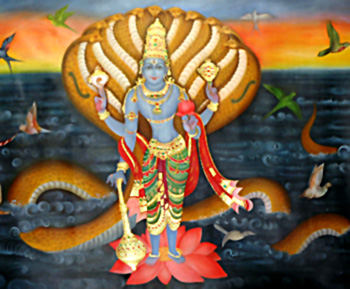 Animal Gods embody divinity. These are used in a symbolic sense as attributes. In some cases animals are depicted as divine creatures. Many animals are given the status of a god or demi god. Among these Lord Ganesha plays a major role and he is incomparable to other Gods. Some of the animal Gods are mentioned below:
Animal Gods embody divinity. These are used in a symbolic sense as attributes. In some cases animals are depicted as divine creatures. Many animals are given the status of a god or demi god. Among these Lord Ganesha plays a major role and he is incomparable to other Gods. Some of the animal Gods are mentioned below:
Snake
Snakes have been honoured in India since ages. They are considered as the saints of waterways, lakes and springs. They symbolize life and fertility. They also symbolize eternal cycle of time and immortality as they appear constantly to restore themselves by shedding their skin.
Snakes are considered as semi-divine and semi-demonic creatures. They are descendants of the snake kings, Takshaka, Vasuki and Shesha. They protect all the earthly treasures and inhabit the water paradise. They are by nature cunning, wise and strong. Their friendship must be protected by sacrifices. In mythological tales the snake kings play a unique role. King Vasuki`s head supports the world. Lord Vishnu rests in a celestial nap in the coils of the snake named Shesha.
Monkey
Monkey has been considered as inhabitant of the woods. Monkey has traditionally been the godly protector of the people of South India as they cultivated their fields in the jungle.
In Ramayana, Lord Rama secures the help of the armies of the divine king of the monkeys, Sugriva. These armies of monkeys are very courageous and strong. Lord Hanuman was their leader and has achieved immortality by his impressive deeds of courage, strength and devotion. Vanaras are depicted as men with head of a monkey and a tail,
Birdman
Garuda, the demigod, who is partly man and partly eagle, is known as the creature which carries Lord Vishnu. Garuda is considered as the king of the birds. This bird symbolizes wind, the sun and speed. He is also a symbol of the mysterious wisdom of the Vedas.
Holy animals
Cows are considered as Holy animals. Cow is symbolically considered as the holy feeder. It should not be killed under any conditions. According to mythology Surabhi is the mother of all cows and symbolize abundance. She grants purity and success.
Bull symbolizes male reproductive power. The four legs of the bull represent truth, purity, sympathy and kindness. A man is liberated from purity if he touches a bull`s tail. The white bull belongs to Lord Shiva as a symbol and also acts as his vehicle.




















